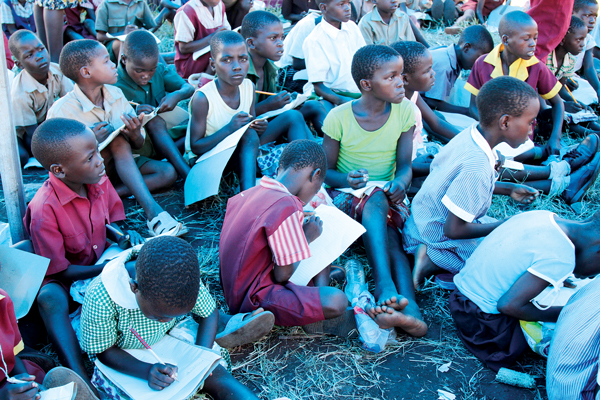
Nyuni Secondary School in Chingwizi, Mwenezi, set up to accommodate children of victims of the Tokwe-Mukosi dam floods, is being swamped by pupils from other areas as it offers free education, Masvingo provincial education director Zedius Chitiga has said.
By Phyllis Mbanje
Speaking during a tour of the area this week, Chitiga said this was putting immense pressure on the meager resources available.
“Unfortunately, we cannot turn away these children, but ask for more assistance,” Chitiga said.
Following a donation of over $1 million by the Japanese government last year, to lessen the burden for mostly women and children in accessing social services, the school along with four primary schools received a facelift with more tents and learning materials. The education director said 2 974 children attended the four primary schools, while 522 were enrolled at Nyuni, which is the only secondary school in the area.
He said enrolment at Nyuni had increased by over 14% while the pass rate improved from 14% to 18%. However, the schools, which use makeshift tents as classrooms and accommodation for teachers, still needed more resources to improve standards.
“The early childhood development classes are using mats as they do not have benches or desks. It is not a favourable situation,” said Chitiga.
- Chamisa under fire over US$120K donation
- Mavhunga puts DeMbare into Chibuku quarterfinals
- Pension funds bet on Cabora Bassa oilfields
- Councils defy govt fire tender directive
Keep Reading
Teachers at these schools have been accorded a special quota by the government whereby they are allowed to further their studies without paying fees.
“This is aimed at motivating them and at the same time improving the quality of education,” Chitiga said.
Meanwhile, the over $1m Japanese fund administered through the United Nations Children’s Fund (Unicef) and implemented by partners has improved hygiene conditions. District environmental health officer Jesca Keche said diarrhoeal cases had decreased.
“In November there were 83 cases, December recorded 61 and by end of January this had gone down to 33,” Keche said.
The community has formed health clubs with zero tolerance to open defecation. Over 1 000 pit latrines have since been dug up.
However, of concern are water shortages with most of the boreholes drying up.
Speaking at the same event, Unicef representative Jane Muita said when they sourced for the fund, their area of focus was women and children who bore the worst of any disaster.
Japanese ambassador to Zimbabwe Yoshi Tendai Hiraishi said he was concerned about the drought situation and pledged further assistance.
“Poor rains will affect communal farmers the most and we must address this,” he said.












